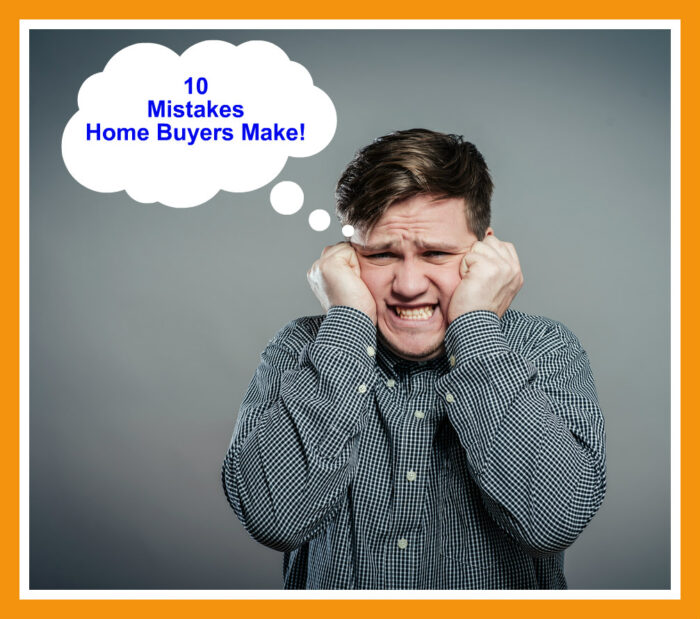10 Mistakes Home Buyers Make When Purchasing a Home
You’ve heard it many times before….buying a home is one of the biggest financial investments you will make in your lifetime. And one you will probably make several times during your lifetime. However, without the right information or guidance, you can make a serious mistake. Sure, you have been out looking at homes with your real estate agent, and you are excited because you have “found the one!” And this starts to become an emotional decision instead of a business decision, which is how you should look at it. So you don’t want to make a costly mistake, right?
If you are a first-time home buyer, all of this is really important. You don’t want to get started on the wrong foot with your first home purchase. It will have an impact when you go to make your second purchase.
Let’s take a look at 10 Mistakes Home Buyers Make When Purchasing a Home!
Knowing Your Credit Score and the Impact
Unless you are a buyer with a truck-load of cash, you will be getting a mortgage to finance (pay for) your new home. And the terms of that mortgage will be based extensively on your credit score. If you don’t have a good score, you may not even qualify for a mortgage, may have a higher interest rate, or not be able to get a large enough mortgage for the home you want. You want to manage your credit score.
This is accomplished first and foremost by making all your monthly payments on time. But the accumulated debt you have will also impact your score, and could keep you from getting a loan. If you have ever filed for bankruptcy, or have accounts that may have been sent to debt collection, this will have a negative impact.
You can manage this is a couple ways. First, don’t open a bunch of credit accounts. Secondly, those you do have, pay them on time, and don’t run them up to their credit limits. Especially, don’t ignore medical bills. If you have had any “medical event” that you have bills for, most all medical institutions will work with you on a payment plan to keep you from going to collections. Also, you might have some kind of error on your credit report….you paid off a credit card, and “closed” the account, but it is still showing on your report. Getting these things cleared up in advance will help you in the future.
Your Down Payment – or Lack Of
In today’s lending world (2021) there are so many different loan programs, it’s hard to keep track of them! (We have a great Lending Team that can find the right mortgage for you!) But you don’t need 20% of the purchase price as a down payment. You could find a mortgage with as little as 3% down payment, again based on the credit score we just talked about, as well as your income. But you need to have those funds already saved. The more you have saved, the better it is. If you have MORE than you need for a down payment, there are other things this money will be handy for. (See Emergency Fund later in this article). Yes, there are down payment assistance programs, and they come and go, and have numerous strings attached to them. We are not saying you can’t use something like this, but you may be better off having your down payment saved.
If you know you want to purchase a home, start saving sooner, rather than later. You can set up a special savings account and put money in there each month. A great way to build this balance is if you receive any kind of annual or quarterly bonus….deposit it right to the down payment account. You might need to establish a budget and cut some daily spending habits (yes, make your own coffee instead of that coffee shop on the corner!) Also, try to avoid taking on new debt while you are saving.
Being Pre Approved BEFORE You Shop for a Home
 Yes, you are excited about your new home potential, and it’s so easy to “window shop” on the Internet on any number of real estate websites for your new home. But what if you see “that home” and then find out it’s more than you can afford? That can be some serious heartbreak! And we don’t want that!
Yes, you are excited about your new home potential, and it’s so easy to “window shop” on the Internet on any number of real estate websites for your new home. But what if you see “that home” and then find out it’s more than you can afford? That can be some serious heartbreak! And we don’t want that!
By meeting with a lender first (or very early in the process) you will have a much better understanding of what you can afford, and what the costs will be. Besides the down payment we just talked about, there are closing costs associated with your mortgage. These also vary based on the type of mortgage you have, and are additional funds you may need to have. ( Your real estate agent may be able to negotiate to have some of these costs paid for by the Seller, but that is not always possible)
But knowing the price range you can afford, BEFORE you start searching, will help you focus on certain neighborhoods or buildings because of the price of those homes. Also, depending on your down payment amount, you pay have to pay for private mortgage insurance, which will affect your monthly payment. This is something you can discuss with your mortgage lender to see what is the best loan option for you.
Buying the Most Expensive House in a Neighborhood
If you pay top dollar for your home, it may take you much longer to see equity in that home. If you know you are going to be there for several years, this might be ok. But if you suddenly have to sell (job relocation, divorce, etc) you could end up in a difficult situation. If values keep rising, you may be fine. But if there is a bump in the road, you now may have a house that is not worth what you paid for it. And that leads us right into….
The Homes’s Re-Sale Value
You want to look at the sales trend in the neighborhood or building where you are buying. If, and when, your needs change and you want to move up to a larger home, you want to look at the ability to sell your home in the future. Again, if you paid the highest price in the neighborhood, will you still be able to be the highest price again? Or will other homes in the neighborhood have risen in value as well? You also want to know that your home is a desirable floor plan, or lot location for a future buyer. In a condo building, you might think lower floor vs. a higher floor and what the current view is and what the future view can be. As you live in the home, you will want to keep the resale value in mind as you make changes to the home. You might love those trendy red cabinets, but the next buyer may not! Let’s keep looking at 10 Mistakes Home Buyers Make When Purchasing a Home.
Job Stability
Depending on your career, there may be ever present opportunities to make a job change for a better salary, or job location. Great…but don’t do it while you are in the middle of the home buying process. This can throw a real kink in your mortgage process. Lenders check your employment at the beginning of your loan process. And they do it again just before you close. If there is a possibility out there, discuss it with your lender. Sometimes, they can still move your loan forward, but you certainly don’t want to suddenly be in a position to have your loan denied, and be in default on your contract to purchase the home.
Making a Large Purchase Before Closing
Simply put, you want to do nothing to change your credit during the loan process. We talked about your employment above, but you don’t want to make any large purchases that involve credit.
You found that great house, but you want all new living room furniture! Great! Just buy it AFTER you have closed on your home! Even if you have saving and want to pay cash, your loan approval may have been based on your cash reserves, and these can be verified again by the lender prior to your closing.
Buying a Home Close to Your Job
Ok, you are thinking, “How can this be a mistake?” A short commute? Save commuting costs? Sure, those are valid points. BUT…what happens when you change jobs? (Not during the loan process however!) Now you may have a really long commute. We are not saying this is not a good thing to do, but you want to take other factors into consideration. If you have a family, or are planning on one, schools might be more important than your commute time. Lifestyle? You want to be able to leave the car parked on the weekend and walk to parks or restaurants? But your job is in a suburban office park? Then you might want a longer commute as a trade-off to your weekend time and activities. It’s worth a few moments of thought.
Emergency or Contingency Fund
 Being a homeowner brings a level of responsibility. Maybe that refrigerator that was included with the sale goes on the blink. A roof leak appears. And of course there are the personal things (medical, dental) that you want to have some reserves for.
Being a homeowner brings a level of responsibility. Maybe that refrigerator that was included with the sale goes on the blink. A roof leak appears. And of course there are the personal things (medical, dental) that you want to have some reserves for.
Future remodeling and changes is another “fund” you may want to set up. You bought the home or condo for the awesome location, view or floor plan, but really don’t like the bathroom finishes. You agreed this is something you could live with short term, but want to change in the future. Start tucking away a few dollars every month to get ready for that change, and when the time comes, you will have cash on hand to pay for the renovations.
Final Thoughts
We are here to help you navigate the purchase of your home, and make the process as stress free as possible. By knowing, and avoiding, these mistakes, it will be that much easier. A smooth closing is a wonderful event!
If you have any questions about the home buying process, we are always just a call, click or text away!

